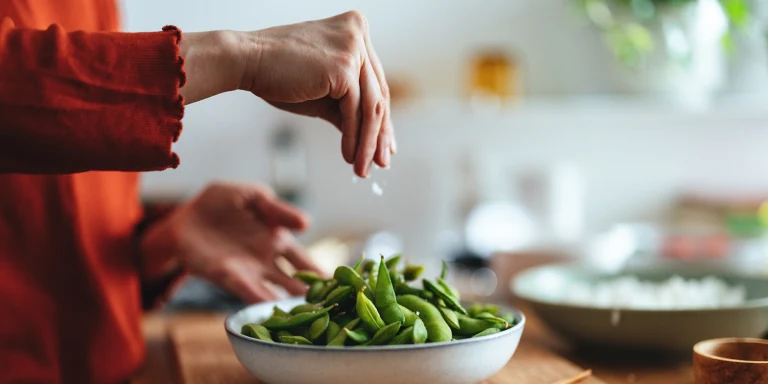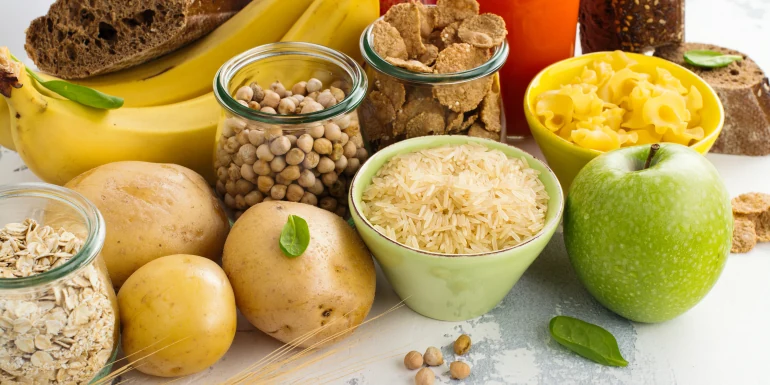
Protein: functions and good sources of protein
What does protein do and can protein help with weight loss? Does protein help to build muscle? Find out about plant-based and animal protein sources and the recommended daily protein intake. You’ll also get tips for a high-protein diet.
What is a protein?
What exactly are proteins? They are nitrogen-containing organic compounds made up of chains of amino acids that vary in length. Your body is continually breaking down proteins and building new ones. Protein is an indispensable part of our diets and keeps us fuller for longer.
What can protein help with?
What does protein do in the body? Your body uses protein for energy, among other functions. This happens mainly when your body lacks other sources of energy such as carbohydrates. One gramme of protein provides around 4 calories of energy.
But above all, protein provides our bodies with key amino acids. There are 21 different types of amino acid in total. The body needs these to produce endogenous proteins like muscle mass, hormones and enzymes. There are nine essential amino acids – essential precisely because your body cannot produce them itself. It can, however, produce non-essential amino acids itself, which means we don’t need to get as much of these from our food.
Proteins and their functions
The body’s own proteins have various jobs depending on their type:
- Enzymes accelerate chemical processes in the body’s cells.
- Hormones serve as messenger substances. They regulate various bodily functions.
- Structural proteins support and stabilise connective and supporting tissues, and bones too.
- Contractile proteins facilitate muscle contractions.
- Transport proteins help to carry hormones, fats and oxygen, among other things.
How many grammes of protein do you need per day?
Your daily protein requirement depends on your body weight and age. The amounts stated refer to the recommended daily protein intake in grammes per kilogramme of body weight.
|
|
|
|
|---|---|---|
|
|
|
|
|
|
|
|
|
|
|
|
|
|
|
|
|
|
|
|
|
|
|
|
Age group |
Men
Women
Children and young people, 4 to 15 years old |
0.9 |
0.9 |
Young people, 15 to 19 years old |
0.9 |
0.8 |
Adults, 19 to 65 years old |
0.8 |
0.8 |
Adults from the age of 65 |
1.0
1.0
Pregnant women
0.9 (second trimester) 1.0 (third trimester) |
Breastfeeding women
1.2
You can use an online required protein intake calculator to calculate your unique protein requirements. Simply enter your gender, age and how active you are. After doing so you will see your own recommended daily protein intake.
High-protein diets are particularly important in old age. Why is it good to get more protein as you age? As we age, our muscle mass starts to decrease. Getting enough protein in old age combats this. In combination with enough exercise, getting enough protein in old age can actually build muscle. That’s why it’s especially important to get your recommended daily protein intake once you reach 65.
Recommended daily protein intake for athletes
Performance athletes often need a higher daily intake of protein. Researchers recommend getting between 1.2 and 2 grammes of protein per kilogramme of body weight for roughly five hours of sport a week. As well as getting protein to build muscle, another factor is the type of training you do.
Can protein help with weight loss too? Scientists confirm: Proteins help if you want to lose weight. That’s because high-protein weight-loss diets keep you fuller for longer and can help to stabilise blood sugar. Opt for plant-based protein sources and follow a balanced diet.
Which foods contain a lot of protein?
There are many different foods that contain protein. High-protein foods range from plant-based or vegan protein sources right through to protein sources of animal origin. Here are a few examples:
- Dried meat
- Pumpkin seeds
- Lentils
- Cottage cheese
- Low-fat quark
Plant and animal proteins are composed of the same amino acids. However, they differ in their biological value (BV) because of the number of amino acids they contain. Biological value indicates the quality of proteins. Essential amino acids are primarily contained in animal protein sources. These are generally of higher value than plant-based protein sources. Why does the body need high-quality protein? As a general rule, the higher the biological value, the easier it is for the body to convert dietary protein into endogenous protein, so even small quantities can cover your protein requirements. You can find information about the biological value of common foods in this table:
|
|
|
|---|---|
|
|
|
|
|
|
|
|
|
|
|
|
|
|
|
|
|
|
|
|
|
|
|
|
|
|
|
|
|
|
Food
Biological value
Whole egg
100
Tuna
92
Pork
85
Low-fat quark
81
Soya
81
Poultry, beef
80
Potatoes
76
Beans
72
Corn
72
Nuts and seeds
66-76
It’s worth noting that BV does not indicate how much protein a foodstuff contains. For instance, as a plant-based (vegan) protein source potatoes have a similar biological value to poultry. When you measure the BV per 100 grammes, however, poultry contains considerably more protein.
Vegan and plant-based protein sources
Unlike animal proteins, sources of protein that are vegetarian (meaning: plant based) often contain less sulphur, saturated fats and cholesterol. Which foods contain a lot of plant-based protein? Vegan foods that are high in protein include:
- Pulses such as lentils, beans, chickpeas, soya beans and lupins
- Seitan
- Tofu
- Grain products like oats, millet, buckwheat and spelt
- Nuts and seeds like pumpkin seeds, hemp seeds and almonds
High-protein foods of animal origin
Animal and human proteins have a similar amino acid pattern, which is why they are particularly well absorbed by the body. Animal foods that contain protein include:
- Meat
- Fish
- Eggs
- Milk and dairy products
Is there such thing as too much protein?
What happens with excess protein? These proteins help the body generate energy. Neither the Swiss Society for Nutrition (SGE) nor the World Health Organization (WHO) have given any official recommendation for the maximum amount of protein you should consume. However, various studies show that consuming more than two grammes of protein per kilogramme of body weight may damage the kidneys.
Whey protein is a source of protein obtained from whey. Whey is a by-product of cheese production, and whey protein contains all essential amino acids. The digestive tract absorbs it quickly. Athletes often use it as part of a high-protein diet to build up muscle. Some people also use whey protein as a food supplement if they are at risk of not getting enough protein without it, for instance if they are experiencing loss of appetite or suffering from cancer. However, excessive quantities of this protein source can occasionally cause gastrointestinal symptoms.
Good sources of protein: nutrition tips
A protein-rich diet supports your immune system and helps build muscle. It also helps keep you feeling full. It is therefore recommended that 20 to 25 per cent of your daily calories come from protein.
If you eat a balanced and varied diet, you won’t need to use any protein shakes as a protein source. There are plenty of animal- and plant-based protein sources that help to have a balanced diet. Ideally, every meal should contain a protein source.
Here’s how to incorporate more protein in your diet:
- Try out different sources of protein – whether vegan (plant-based) or animal. This will help you to find the best protein sources for your tastes. For more inspiration, look at lists of high-protein foods that include all good protein sources.
- Enhance your meals with additional sources of protein like pumpkin seeds, almonds or walnuts.
- Opt for high-protein snacks. Which snacks contain protein? High-protein snack options include nuts, toasted chickpeas, cottage cheese or fresh vegetable sticks with hummus.
- Combine different sources of protein, like tofu and potatoes or corn and beans. This will increase the biological value of dishes – meaning the body can more easily convert the proteins into endogenous proteins.
Tip: Use the Helsana Coach app. This has different recipes designed for ensuring a balanced diet.
Protein is part of a balanced diet. Incorporate a variety of sources of protein into your meal plan to support your body’s vital functions – essential for an active and vigorous lifestyle.

The specialist provided the editorial team with advice and input for this article. Andrea Bovisi (BSc BFH dietitian) works in the Helsana Health Consultation Service. She helps customers on issues to do with nutrition and health promotion.


Newsletter
Find out more about current health issues every month and get all the information you need about our attractive offers from all Helsana Group companies * delivered by e-mail to read whenever it suits you. Our newsletter is free of charge and you can sign up here:
We did not receive your information. Please try again later.
* The Helsana Group comprises Helsana Insurance Company Ltd, Helsana Supplementary Insurances Ltd and Helsana Accidents Ltd.